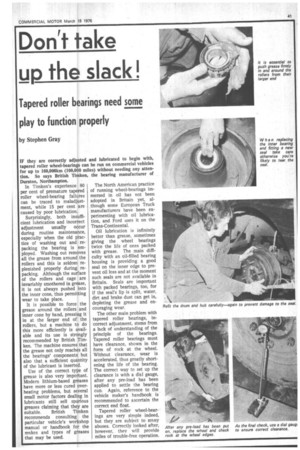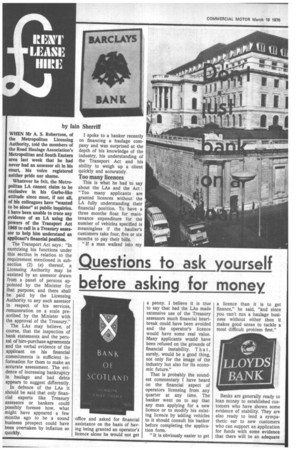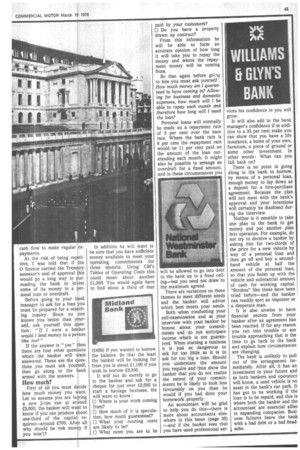Don't ake up th slack
Page 43

Page 44

Page 45

If you've noticed an error in this article please click here to report it so we can fix it.
Tapered roller b arings need some play to function properly
by Stephen Gray
IF they are correctly adj tapered roller wheel-bearin for up to 160,000km (100,0 tion. So says British Ti Durston, Northampton.
In Timken's experience 80 per cent of premature ta I red roller wheel-bearing fail res can be traced to maladj stment, while 15 per cent are caused by poor lubrication Surprisingly, both ins fficient lubrication and incor ect adjustment usually o cur during routine mainten ce, especially when the old racdee of washing out and repacking the bearing is employed. Washing out rem ves all the grease from aroun. the rollers and this is seldo replenished properly durin repacking. Although the su ace of the rollers and cage are invariably smothered in g se, it is not always pushed into the inner cone, thus permi ting wear to take place.
It is possible to force the grease around the rollers and inner cone by hand, pressi g it in at the larger end of the rollers, but a machine ti do this more efficiently is vailable and its use is str gly recommended by British Timken. The machine ensure that the grease not only reach s all the bearings' component but also that a sufficient qu ntity of the lubricant is insert d.
Use of the correct ty,e of grease is also very impo ant. Modern lithium-based g ases have more or less cured verheating problems, but s veral small motor factors deali g in lubricants still sell sp 'Sous greases claiming that th are suitable. British Ti ken recommends consulting the particular vehicle's wor shop manual or handbook f the mikes and types of g eases that may be used. The North American practice of running wheel-bearings immersed in oil has not been adopted in Britain yet, although some European Truck manufacturers have been experimenting with oil lubrication, and Ford uses it on the Trans-Continental.
Oil lubrication is infinitely better than grease, sometimes giving the wheel bearings twice the life of ones packed with grease. The main difficulty with an oil-filled bearing housing is providing a good seal on the inner edge to prevent oil loss and at the moment such seals are not available in Britain. Seals are important with packed bearings, too, for if the seal's lip is split, water, dirt and brake dust can get in, depleting the grease and encouraging wear.
The other main problem with tapered roller bearings, incorrect adjustment, stems from a lack of understanding of the principle of the bearings. Tapered roller bearings must have clearance, shown in the form of rock at the wheel. Without clearance, wear is accelerated, thus greatly shortening the life of the bearing. The correct way to set up the clearance is with a dial gauge, after any pre-load has been applied to settle the bearing cup. Again, reference to the vehicle maker's handbook is recommended to ascertain the correct end float.
Tapered roller wheel-bearings are very simple indeed, but they are subject to mqny abuses. Correctly looked after, however, they will provide miles of trouble-free operation. WHEN Mr A. S. Robertson, of the Metropolitan Licensing Authority, told the members of the Road Haulage Association's Metropolitan and South Eastern area last week that he had never had an assessor sit in his court, his voice registered neither pride nor shame.
Whatever he felt, the Metropolitan LA cannot claim to be exclusive in his Garbo-like attitude since most, if not all, of his colleagues have "wanted to be alone" at public inquiries. I have been unable to trace any evidence of an LA using the powers of the Transport Act 1968 to call in a Treasury assessor to help him understand an applicant's financial position.
The Transport Act says : "In exercising his functions under this section in relation to the requirement mentioned in subsection (2) (e) thereof, a Licensing Authority may be assisted by an assessor drawn from a panel of persons appointed by the Minister for that purpose; and there shall be paid by the Licensing Authority to any such assessor in respect of his services, remuneration on a scale prescribed by the Minister with the approval of the Treasury."
The LAs may believe, of course, that the inspection of bank statements and the perusal of hire-purchase agreements and the verbal evidence of the applicant on his financial commitments is sufficient information for them to make an accurate assessment. The evidence of increasing bankruptcy in haulage and bad debts appears •to suggest differently.
In defence of the LAs it should be said that only financial experts like Treasury assessors or bankers could possibly foresee how, what might have appeared a few months ago to be a sound business prospect could have been overtaken by inflation so quickly. I spoke to a banker recently on financing a haulage company and was surprised at the depth of his knowledge of the industry, his understanding of the Transport Act and his ability to weigh up a client quickly and accurately.
Too many licences
This is what he had to say about the LAs and the Act: "Too many applicants are granted licences without the LA fully understanding their financial position. To have a three months float for maintenance expenditure for the number of vehicles specified is meaningless if the haulier's customers take four, five or six months to pay their bills.
"If a man walked into my office and asked for financial assistance on the basis of having being granted an operator's licence alone he Would not get a penny. I believe it is true to say that had the LAs made extensive use of the Treasury assessors much financial heartbreak could have been avoided and the operator's licence would have some real value. Many applicants would have been refused on the grounds of financial instability, That, surely, would be a good thing, not only for the image of the industry but also for its economic future."
That is probably the soundest commentary I have heard on the financial aspect of operators licensing from any quarter at any time. The banker went on to say that any man applying for a new licence or to modify his existing licence by •adding vehicles to it should consult his banker before completing the application form.
" It is obviously easier to get a licence than it is to get finance," he said, "and since you can't run a haulage business without either then it makes good sense to tackle a most difficult problem first."
Banks are generally ready to loan money to established customers who have shown some evidence of stability. They are also ready to lend a sympathetic ear to new customers who can support an application for funds with some evidence that there will be an adequate cash flow to make regular repayments.
At the risk of being re titive, I was told that if the 0 licence carried the Trea ry assessor's seal of approval his would go a long way in ursuading the bank to in est some of its money in a ersonal loan or overdraft.
Before going to your ank manager to ask for a loan ou must be prepared for a sea ching inquiry. Since no one knows you better than y urself, ask yourself this q estion: "If I were a bs her would I lend money to a pe son like me?"
If the answer is " yes " hen there are four other ques i ons which the banker will ant answered. These are the uestions you must ask you elf, then go along to the iank armed with the answers.
How much?
First of all you must d how much money you Let us assume you are b a new 2-ton van at ar £2,000; the banker will wa know if you can produce one-third of the capita quired—around £700. Aft why should he risk mon you won't? cide ant. Sting und t to bout rer all y if In addition he will want to be sure that you have sufficient money 'available to meet your operating commitments for three months, Using CM's Tables of Operating Costs this could mean about another £1,300. You would again have to find about a third of that (£400) if you wanted to borrow the balance. So that the least the banker will be looking for from you is about £1,100 if you wish to borrow £3,300.
It will not do merely to go to the banker and ask for a cheque for just over £3,000 to start a haulage business. He will want to know; O Where is your work coming from?
O How much of it is speculation, how much guaranteed?'
O What your running costs are likely to be?
O What rates you are to be paid by your customers?
0 Do you have a properly drawn up contract?
From this information he will be able to form an accurate opinion of how long it will take you •to repay the money and where the repayment money will be coming from.
So that again before going to him you must ask yourself : How much money am I guaranteed to have coming in? Allowing for business and domestic expenses, how much will I be able to repay each month and therefore how long will I need the loan?
Personal loans will normally be made on a repayment rate of 3 per cent over the base rate. Where the bank rate is 8 per cent the repayment rate would be 11 per cent paid on the amount of the loan outstanding each month. It might also be passible to arrange an overdraft for a fixed amount, and in these circumstances you will be allowed to go into debt to the bank up to a fixed ceiling—but you need not draw to the maximum agreed.
There are variations on these themes to meet different needs and the banker will advise which •best meets your needs.
Both When conducting your self-examination and at your interview with your banker be honest about your commitments and do not 'anticipate income which is not guaranteed. When starting a business it it just as dangerous to ask for too little as it is to ask for too big a loan. Should you understate the amount you require and thus show the banker that you do not realise the extent of your commitments he is likely to look less favourably on you than he would if you had done your homework properly.
An accountant will be glad to help you do this—there is more about accountants elsewhere in this issue (page 35) —and if the banker sees that you have used professional ser vices his confidence in you will grow.
It will also add to the bank manager's confidence if in addition to a 33, per cent stake you can show that you have a life insurance, a home of your own, furniture, a piece of ground or some other investment. In other words : What can you fall back on?
There is no point in going along to the bank to borrow, by means of a personal loan, enough money to lay down as a deposit for a hire-purchase agreement. Because the plan will not meet with the hank's approval and your intentions will certainly be disclosed during the interview.
Neither is it sensible to take one plan to the bank Ito get money and put another plan into operation. For example, do not try to deceive a banker by asking him for two-thirds of the price for a new vehicle by way of a personal loan and then go off and buy a secondhand vehicle at half the amount of the personal loan, so that you finish up with the vehicle and substantial amount of cash for working capital. "Strokes" like these have been tried before—and the banker can readily spot an imposter or a desperate man.
It is also unwise to have financial secrets from your banker after an agreement has been reached. If for any reason you run into trouble or see trouble approaching that is the time to go back to the bank and explain how circumstances are changing.
The bank is unlikely to pull out of the arrangement immediately. After all, it has an investment in your future and as both bankers and operators will know, a used vehicle is no asset in the bank's car park. It has got to be working if the loan is to be repaid, and this is where both the banker and the accountant are essential allies in expanding companies. Business failures leave the bank with a bad debt or a bad headache.








































































































